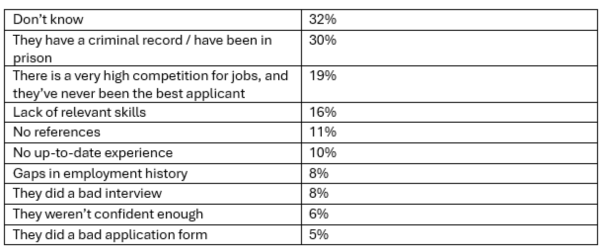Less than a fifth (16%) of UK businesses have recruitment policies in place that proactively target ex-offenders.
Research from IT asset disposal company DSA Connect, which runs programmes to support prisoners in developing new work skills and to find employment, suggests that over half (51%) are experiencing a skills shortage.
Of these, around a quarter (24%) of employers say they are struggling to recruit people with the right skills and experience they need right now, and 27% say they have faced this in the past and may do again in the future.
The survey was carried out amongst over 1,100 businesses with a combined turnover of £15.9 billion.
The top benefit given by employers who have recruited ex-offenders is finding workers with the right skills and experience for the job, said the firm. It added that many businesses are missing out by failing to implement a recruitment policy that actively targets ex-offenders.
Among the fifth (16%) that do proactively target recruiting ex-offenders, around two thirds (62%) currently employ ex-offenders or have done so in the past. And contrary to many stereotypical views, almost all (95%) of these businesses say they were generally pleased with the quality of the work carried out by ex-offenders. Over a third (35%) of businesses say they’ve generally found ex-offenders work to be ‘excellent’ and another 49% say it’s ‘good’. Around one in 10 (12%) say their work, in general, was ‘average’ and just 2% said it was ‘below average’.
Businesses currently have a range of views as to how comfortable they’d feel – in theory – about employing someone with a criminal record. Around a quarter (26%) say they’d feel very or slightly comfortable with it, compared to almost a third (29%) who’d feel very or slightly uncomfortable about employing someone with a criminal record. Around a third (30%) don’t have a strong opinion either way as it doesn’t matter what someone has done in the past. This compares to just 6% who state they would refuse to employ someone with a criminal record, as it just wouldn’t feel safe.
In practice, among businesses who have never hired an ex-offender, the main reason given for this is simply down to the fact they have a criminal record or been in prison (30%). This is followed by ex-offenders not being the best applicant for the job (19%), a lack of relevant skills (16%) and no references (11%). Around a third (32%) didn’t know why they’d never hired an ex-offender.
Table to show the main reasons why businesses haven’t ever hired an ex-offender

While almost all (95%) businesses who have recruited ex-offenders are generally pleased with the quality of their work, around eight in 10 (83%) said they faced challenges or had worries about the recruitment process compared to 17% who said they didn’t face any challenges or have any worries about hiring ex-offenders.
Of businesses who did, the most common worry was about the ex-offender re-offending (31%) and how they would perform in the role (28%). This was followed by worries about their attitude (25%) and stigma from other colleagues not wanting to work alongside them (22%) and from clients or the public not wishing to be served by them (19%). There were also worries that the ex-offender might tempt others into bad behaviour (18%).
The main challenges were ensuring that there were appropriate safety policies in place for all staff and customers (21%), that it took up time and resource from senior leadership (14%) and getting sign off from the Executive and/or Trustees on this recruitment policy (12%).
Harry Benham, Chairman at DSA Connect, said:
“Our new research highlights that particularly when facing a skills shortage, many UK businesses are missing out on valuable employees by not having a recruitment policy to hire ex-offenders. All too often this is simply due to stereotypes and stigma surrounding hiring people with a criminal record or who have been in prison, and the research highlights that many businesses don’t know why they’ve never hired an ex-offender.
“For businesses that have chosen to put specific recruitment policies in place and set up their business in a way that supports and encourages ex-offenders, the research shows that they are being rewarded with high-performing employees who are helping to plug the skills shortage. At DSA Connect, the ex-offenders that we employ do a fantastic job for us and our clients, and at the same time we’ve seen that employment results in significant reductions in re-offending and a means by which ex-offenders can instead turn their lives around.
“It is a fact that, if a person leaving prison has employment, they are far less likely to re-offend and re-offending (according to government statistics) costs the country c.£18billion per year.”
DSA Connect has partnered with Xerox to open workshops at HMP Highpoint and HMP The Mount. These workshops focus on dismantling, auditing and component recovery, where prisoners gain experience in a growing sector while also contributing to a more sustainable circular economy.
At HMP Chelmsford, DSA Connect operates an IT recycling and component recovery workshop, where end of life IT equipment is ethically processed, for many organisations, including NHS Shared Business Services.
Throughout its prison workshops, DSA Connect provides accredited training programmes for prisoners in the release window, as an integral part of their Pathway to Employment scheme, which they operate with OCS. This initiative is also actively supported by IBM, together with certain other large organisations, providing a range of expertise and support.
The company also collaborates with initiatives like Only a Pavement Away, a charity set up to support prison leavers and help them to find work in the hospitality sector.












